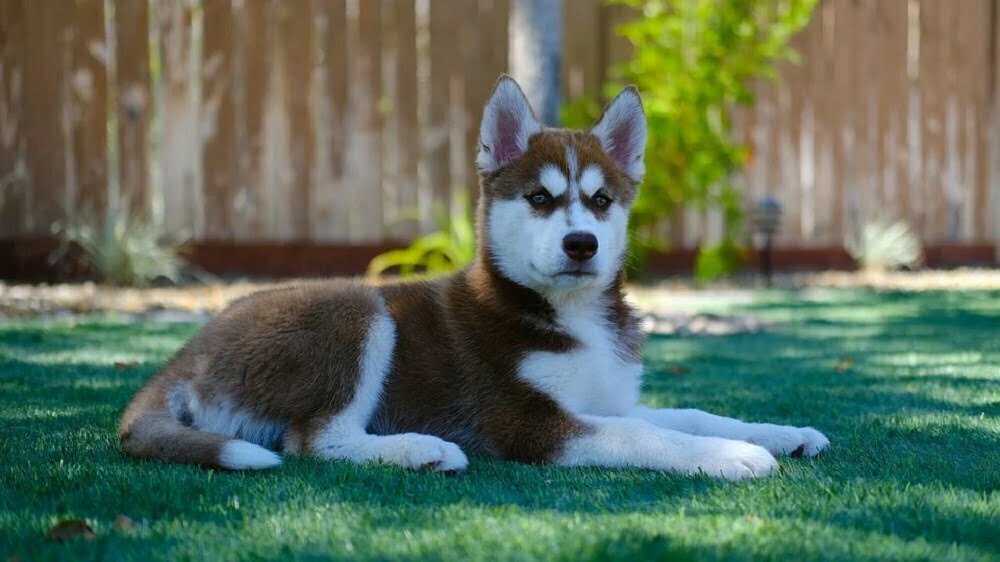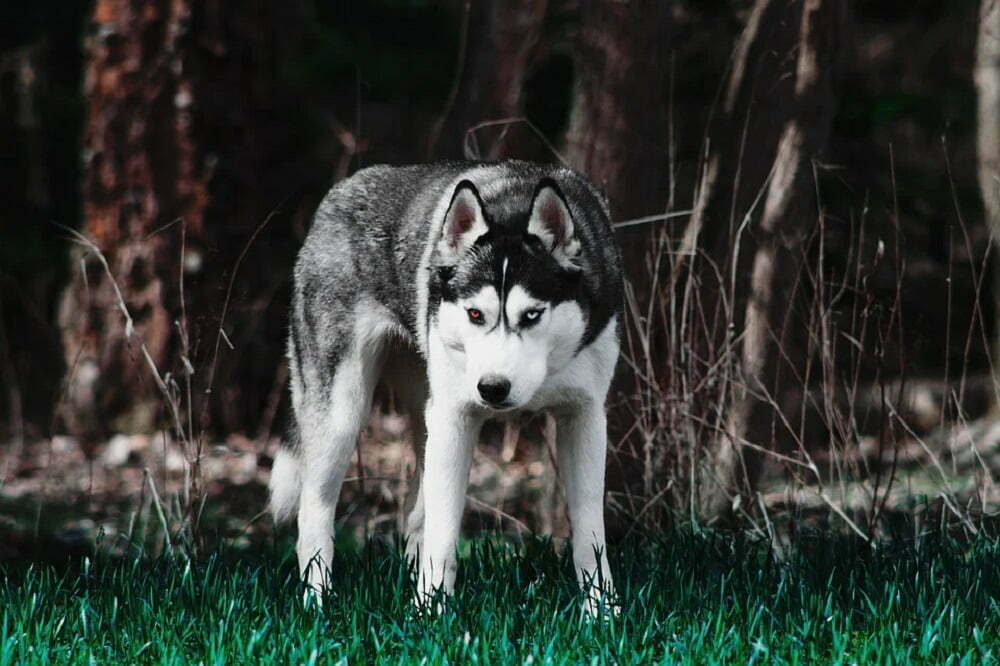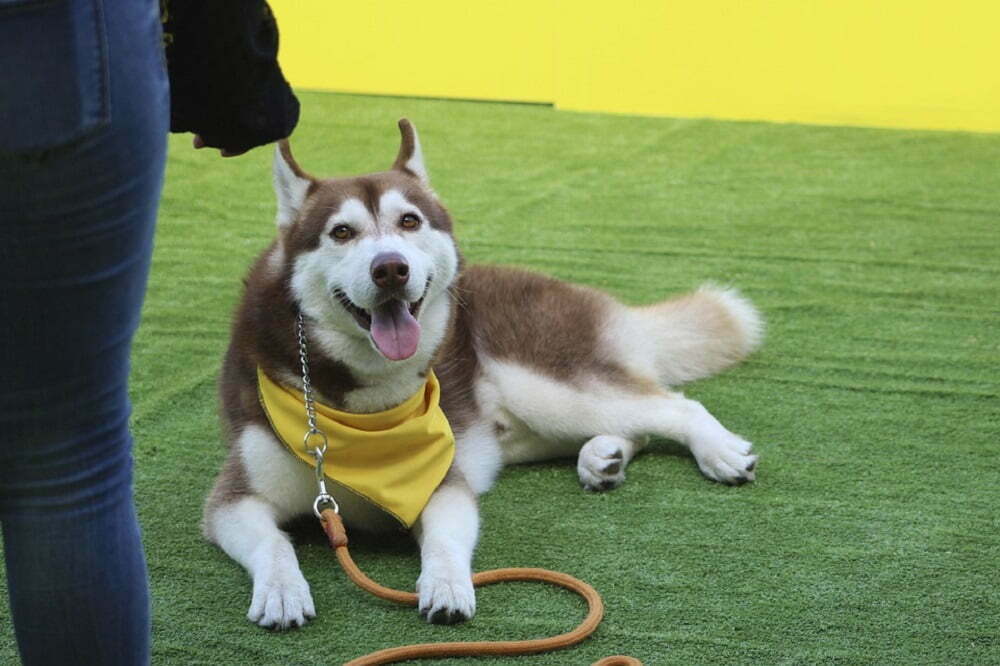Most people think their dog is beautiful, but few can deny the true beauty of the Siberian Husky, with its piercing blue eyes, wolf-like stature, and silvery grey coat.
This dog is known for its strong-willed nature, but it’s also incredibly loyal, humorous, and affectionate. While they’re not dogs for the half-hearted or timid, Siberian Huskies can make devoted companions if you know how to properly care for them.
If you’re keen to find out more about this intriguing breed, keep reading…

Key Facts
Average lifespan
On average, Siberian Huskies have a life expectancy of around 12-15 years.
Minimum exercise (per day)
Siberian Huskies have a lot of energy, meaning they make great jogging or running companions – though be sure not to exercise them outdoors on very hot days, as they don’t fare well in the heat.
Siberian Huskies will require a minimum of 30-60 minutes of exercise per day to keep them from getting bored. They’re big fans of hiking and enjoy plenty of playtime and roaming in the backyard. Traditionally they were working dogs, so they love to have a feeling of purpose and don’t want to laze around too much.
Coat length
Siberian Huskies have a thick, medium-length double coat. The undercoat is soft and dense while the topcoat is thicker and offers greater protection.
Minimum cost (per month)
Nationwide Dogs calculates the monthly cost of a husky to be roughly $115, with an additional $50 a year on toys, brushes, and shampoo.
This cost takes into account their food, medical care, and other minor fees. Dog food for your Siberian Husky is likely to cost between $70 to $125 a month, with vet fees costing about $15 a month just for checks – not taking into account any accidents or illnesses.
Appearance
Siberian Huskies are known for their wolf-like appearance and usually have light blue eyes. Their coats can be black/gray and white, completely white, or red/copper and white, with the markings differing from dog to dog.
- Size: medium-to-large-sized breed
- Average height: 20-24 inches at the shoulder
- Average weight: 35-60 pounds
Temperament
Siberian Huskies are pack dogs and need parents who they can trust and depend upon for their most valuable resources – food, water, treats, toys, and so forth. For this reason, they’re not suited to new or inexperienced dog owners.
Huskies may test their owner’s boundaries at times, and, if their leaders allow it, this may mean taking control. In order to be treated as their pack leader, you need to give an air of boldness, confidence, consistency, and fairness. This means asserting yourself from the very start, not through bullying or aggression, but through laying out some ground rules so your husky knows where they stand.
Despite their strong-willed nature, Siberian Huskies do hold a high respect for their parents/pack leaders and are incredibly loyal once they’re certain of the security and comfort in their pack or family.
Siberian Huskies are not ones for lazing around, and they thrive on action and have a lot of energy that requires adventure and mental simulation to satisfy.
They have strong destructive tendencies, both indoors and outdoors, and these are likely to arise if they feel stir-crazy or bored. They’re also infamous escape artists, meaning a securely fenced yard is essential if you choose the Siberian Husky as a pet. They also have a tendency to dig, which is why it’s best to provide them with a designated area where they can get out their digging impulses.
Despite their wolf-like appearance, Siberian Huskies aren’t natural guard dogs and generally won’t be alarmed by intruders or potential invaders.
This breed is outgoing and social, and usually has a strong sense of curiosity that can often get the best of them at times – hence their escaping tendencies. For this reason, it’s important to keep them leashed when taking them on walks or out in public.
Each Siberian Husky will have their own unique personality: while some may be strong-willed and focused, others will be friendly and energetic. In general, though, this breed is known for its confident disposition and loyalty, but they can also make very loving and affectionate pets.
Apartment Living
Being medium-to-large breed dogs who require plenty of exercise, Siberian Huskies are not best suited to apartment living, especially seen as they like to roam in the yard and dig a lot.
Good for novice owners
Huskies have a tendency to test and challenge their owners, and for this reason, they need an owner who is equally confident and bold. They’re best suited to owners who have previously owned Huskies or have at least owned similar breeds.
Sensitivity level
Siberian huskies are considered a “highly sensitive” breed, meaning they’re very receptive to their environment and their owner’s behavior.
Tolerates Being Alone
As pack dogs, huskies don’t like to be alone. This Siberian breed craves company, love, attention, and extreme care.
Tolerates Cold Weather
Seen as the Siberian Husky was originally bred by the Chukchi people to pull sleds long distances in sub-zero temperatures, this breed has adapted to cold weather with its dense double-coat. This resilient breed can withstand temperatures as cold as -60 degrees F (-51 degrees C).
Tolerates Hot Weather
While the husky’s thick coat keeps it warm in cool weather, this coat can equally render the breed vulnerable to overheating in hot weather. For this reason, husky owners should take precautions during the summer months, particularly in warmer climates, to ensure that their husky is comfortable and safe. This means plenty of shade and water when the husky is outdoors, and perhaps even a plastic toddler pool in the backyard so your husky can cool off!
Affectionate With Family
Siberian Huskies can make affectionate and loving family dogs.
Kid-Friendly
Siberian Huskies can be great family dogs who are tolerant and affectionate towards children. However, it’s still important to supervise them with young children, and as with any dog, you should always teach your children how to approach and interact with the dog properly, and to respect their space at certain times.
Dog Friendly
As outgoing and social dogs, Siberian Huskies generally get along well with other dogs, though it’s highly recommended to socialize them from a young age.
Friendly Toward Strangers
The Siberian Husky usually does not display the possessive qualities of the guard dog, so they tend not to be suspicious of or aggressive towards strangers and are usually good-natured with everyone.
Health And Grooming

Shedding
Due to their thick, double-layer coat, Siberian Huskies shed during the Spring and Fall. For this reason, they require weekly brushing throughout the year and then daily brushes during the major shedding seasons. That being said, the level of shedding is manageable provided you stay on top of their grooming needs as well as household cleaning.
Drooling
Huskies tend not to drool excessively or often. In fact, owners often notice that their husky has a dry mouth and may question if everything is okay due to the dog’s limited drooling. If your husky begins to drool more than usual, it could be for a specific reason or could signal a health issue.
Grooming
Siberian Huskies are typically good at keeping themselves clean and tend not to carry that common “dirty dog” smell. They won’t need a bath often unless they manage to get themselves exceptionally dirty in some way. When they do require bathing, it’s important to use a good quality dog shampoo that will keep their coat healthy and help maintain the natural oils on their fur and skin that protect their coat.
Huskies need their teeth brushed at least 2-3 times a week, or daily if possible, to help prevent tartar or plaque buildup and other dental issues. They also need their nails clipped about twice a month, or whenever you hear their nails clicking on the floor, which means they’re too long. You can consult a professional groomer or veterinarian to learn how to properly clip your dog’s nails without injuring them if you haven’t done this before.
When brushing your husky, make it a habit to check their ears for any signs of infection – such as redness, swelling, foul odor, etc. If there are any of these symptoms present, consult a veterinary professional.
Keep your husky’s ears clean by using a cotton ball and a safe, pH-balanced ear cleaner to wipe down their ears gently, but never ever stick anything down the ear canal, as this can injure or damage your dog’s hearing.
You should also make it a habit to check the rest of their body for any signs of injury or illness as you groom them. This way, if you notice any potential issues, you can nip these in the bud before they become a more serious problem.
General health
While huskies are prone to some common health issues as other dogs are, they are generally a relatively healthy breed of dog.
Compared to other breeds, Siberian Huskies are also known for their ability to maintain a healthy weight with less food. Though they still require a high-protein diet in order to thrive.
Common health problems
Each breed of dog is susceptible to different health issues, and, while they’re generally healthy dogs, the Siberian Husky is no different in this department. You can lower your husky’s risk of developing these issues by feeding them a healthy diet and ensuring they get plenty of exercise and attention.
Some of the most common health concerns Siberian Huskies are prone to include:
- Cataracts: an opacity that occurs on the eye’s lens, which can lead to blindness or impeded vision.
- Corneal Dystrophy: this is a condition that affects the cornea of the outer transparent portion of the eyeball, and is usually caused by a collection of lipids in the cornea.
- Progressive Retinal Atrophy (PRA): This degenerative eye disorder can potentially cause blindness from the loss of photoreceptors in the back of the eye. It can be detectable before any blindness starts to occur, which is why regular health checks for your dog are important.
If you have any concerns about your Siberian Husky, don’t hesitate to consult a veterinary professional. Many of the above health issues can be prevented by taking proper care of your Siberian Husky and ensuring they get frequent medical examinations.
Potential For Weight Gain
If your Siberian Husky gets plenty of exercise and is fed a nutritious diet, there’s no reason why they should be overweight.
Your husky may be gaining weight due to eating too much throughout the day, eating too many carbohydrates, not getting enough exercise, water retention or bloating, or due to a health problem such as hyperthyroidism.
Trainability

Easy To Train
While Siberian Huskies are intelligent dogs and can respond well to training, it can be a little tricky as this breed is strong-willed and needs to know who’s boss from the very start. Training a Siberian Husky will require patience, consistency, a firm will, and possibly some assistance from a training professional.
It can also be challenging to carry over what they’ve learned with a professional trainer into your own home, as huskies often differentiate the two environments. This may be a reason why they’re perfectly behaved in classes but not so perfect at home. With time, consistency, and a lot of patience, this gap can be bridged.
Crate training is recommended for Siberian Huskies, as this can help with housebreaking and will also give them a safe, secure space to retreat to whenever they need some downtime. That being said, your Siberian Husky should not be confined to a small enclosed space for long durations. As we said earlier, these dogs are high energy and free-spirited, and for this reason, are not suited to small spaces.
Leash training is a necessity for Siberian Huskies and is something that should be practiced from puppyhood. This breed is curious and outgoing, and without a leash, they will chase after anything and everything that piques their interest.
Intelligence
Siberian Huskies are considered smart – they are great problem solvers and do very well with food puzzles and brain games.
Potential to bite
Siberian Huskies are not considered dangerous or aggressive dogs. Like any dog breed, they require training from a young age and should be treated with care and respect. Young children should also be taught how to approach the dog and respect its space properly.
Tendency To Bark Or Howl
While they don’t bark that much, Siberian Huskies enjoy howling.
They don’t usually bark at strangers or intruders, which is why they don’t make good guard dogs!
History
Originating in Northeast Asia, Siberian Huskies were bred by the Chukchi people of Siberia for sled pulling, and companionship. In 1908, Siberian Huskies were brought to Nome, Alaska, to work as sled dogs, and were eventually developed and used for sled dog racing.
In 2015, a DNA study indicated that the Siberian Husky, the Alaskan Malamute, and the Alaskan husky share a close genetic relationship and are related to Chukotka sled dogs from Siberia.
Costs
Generally, you should expect to pay between $600-$1,300 for a Siberian Husky, though according to NextDayPets, the median price for Huskies is $975. Bear in mind that dogs with a superior pedigree will cost even more, and those with exceptional breed lines can cost upwards of $1,700, even going as high as $10,000.
Fun Facts
- Siberian Huskies have adapted to endure severe winter weather. They have a double coat that includes a short undercoat to help retain body heat, and a long water-resistant outer coat, while their almond-shaped eyes offer protection from loose snow and strong sunlight. Not only this but their long, bushy tails can be wrapped around their faces while they sleep to provide extra warmth!
- Heterochromia—eyes of two different colors—is fairly common among huskies, often resulting in blue, gold, brown, or orangey-colored eyes.
- Huskies are able to sprint for hours upon hours not only without food, but without tapping into their bodies’ carbohydrates or fat stores.
- Siberian Huskies are considered “talkative”, and this breed is often found jabbering, groaning, and grumbling!
- A husky howl can be heard from an impressive 10 miles away!
- According to the American Kennel Club, huskies’ coats can be one of six colors—black, agouti, gray, red, sable, and white—but there are a tonne of variations out there.
- While blue eyes are pretty rare for many dog breeds, most huskies are born with bright blue eyes which adds to their enchanting and enticing appearance!
